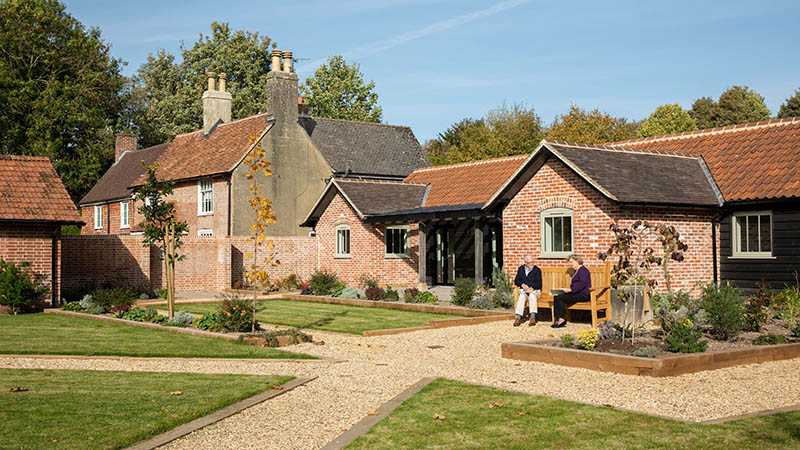New Trends in Retirement Living
Go backPublished on www.whathouse.com 15th July 2022

Richard Williams of Cognatum
The pandemic has changed buyer behaviour across all sectors of the property market, but perhaps the most obviously affected is the retirement sector. For many, lockdown was a foretaste of retirement, with time on their hands; and for those already retired, without work to fill the days the options to pass the time were severely curtailed, with plenty of time for reflection.
Richard Williams of Cognatum said: “After two years with periods of enforced inactivity and solitude, retirees are giving more consideration to how they would like to spend their time. There is a real sense of wanting to make the most of opportunities, so somewhere with a host of things to do on the doorstep is hugely appealing. Whatever your ‘thing’ is – book groups, walking, art exhibitions or escaping to the golf course, you want to be able to do it as often and as easily as possible! Local interests and hobbies are rising to the top of pros and cons lists, with retired buyers seeking properties where there is plenty to do, from walks to sports, clubs to pubs, literally on the doorstep. The ability to walk to facilities such as shops, pubs, doctor, chemist, church, cinema and local friends is vital. In many cases people are giving up their car, or cutting down from two to one, so good transport links are important.
“For many people, the lack of social interaction during the pandemic was a significant loss, so for those contemplating a change of location finding a ready-made community, and introduction to clubs and societies, is also a real attraction. The low-key support that comes with being part of a community is influencing buying decisions.
“Conversely, what we are also seeing is that people found things they enjoyed during lockdown, and developed habits that they want to keep up – walking of course, none of us had ever walked so often or so enthusiastically, but cooking and painting are also what we are hearing anecdotally. People are looking for modern kitchens, or kitchens that are ripe for renovation; large airy conservatories and rooms with lots of natural light.
“Popping out to a local café became a real treat, and many of us have continued to treat ourselves – retirement properties within towns and large villages with their bustling centres is a distinct trend.
“An interest in gardens also is a post-Covid trend that we expect to continue. Whether it’s for ‘safe’ socialising, the satisfaction of growing fruit and vegetables, or simply having somewhere nice to sit with a drink and a book in the evenings, outside space is a real vote-winner.
“Without wanting to be morbid, we have also seen a realisation among purchasers that time is not endless. While purchasers might be reluctant to describe themselves as vulnerable at the moment, they are more open to acknowledging that their needs may change than we have seen previously. This has a two-fold effect, both a determination to enjoy living independently for as long as possible, and also caution against making unnecessary house moves; purchasers are looking to make one sensible move that is fairly future-proofed, rather than several moves which can be draining both financially and emotionally.
“Flexible space is king; a property that has space for a bedroom and bathroom downstairs for the future if required, but that in the meantime can be used as extra reception or hobby space is ideal, as are spaces that can be both study and spare bedroom. We are particularly seeing an interest in properties with good downstairs space, and technology, such as installing an internal lift, is making properties that would have previously been ruled out as impractical, an attractive proposition once more.
“Travel is definitely back on people’s radars. The active retired have been forced to kick their heels at home – they want to make up for the last two years and make plans for the future, taking advantage of last-minute deals and quieter times outside school holidays. Thus, apart from the specifics of a property itself, functionality is important, properties that can be locked up and left in the knowledge they will be safe and secure. Again, being part of a community helps here, or living on a managed estate where intruders or a leaking pipe are more likely to be noticed.
“Environmental features, well insulated homes and electric charging features are become more and more in demand. New build retirement estates do tend to perform best in this arena, but we find that older buyers are seeking style and architectural interest rather than efficient but characterless boxes. While retro-fitting environmental features to older properties can be hard, buying good quality housing stock will make the task easier.
“Our experience, which has not changed post pandemic, is that retired people like to be free from the hassles of upkeep, without sacrificing the pleasurable aspects, like coffee and the crossword in the garden. There’s a growing demand for homes with managed facilities such as guest accommodation, communal grounds and shared car schemes, which just make life easier.
“Essentially, we are seeing that increasingly there’s a feeling of wanting to make the most of time and opportunities. Choosing a property that can remove as many headaches and concerns for the future is the way ahead.”

Petersfingers Farm (Cognatum)
For more information:
01491 821170
property@cognatum.co.uk / www.cognatum.co.uk/properties-for-sale/
Cognatum, a not-for-profit company, has 60 retirement estates in 21 counties across central and southern England, a total of 928 retirement homes. All are in prime locations within vibrant market towns or villages, within walking distance of shops and restaurants. Each estate benefits from thoughtful architecture, landscaped grounds, and a dedicated estate manager.